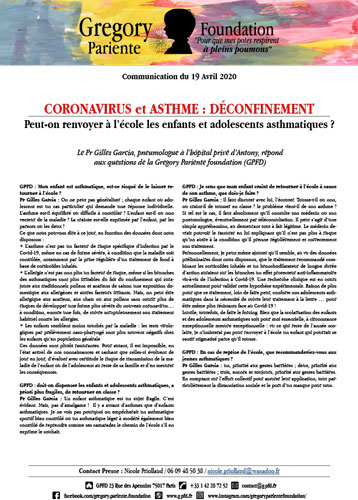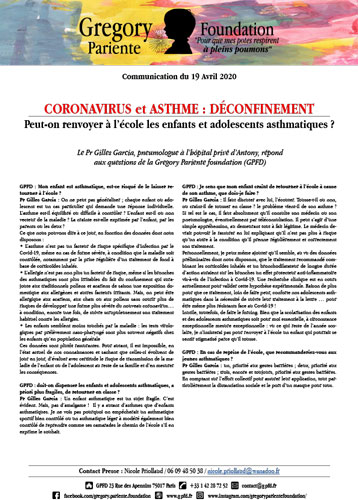
Déconfinement: Peut-on renvoyer à l’école les adolescents asthmatiques?
End of the isolation period: Can adolescents with asthma be sent back to school?

Déconfinement: Peut-on renvoyer à l’école les enfants et adolescents asthmatiques?
Le Pr Gilles Garcia, pneumologue à l’hôpital privé d’Antony, répond aux questions de la Gregory Pariente foundation (GPFD)
GPFD: Mon enfant est asthmatique, est-ce risqué de le laisser retourner à l’école?
Pr. Gilles Garcia: On ne peut pas généraliser ; chaque enfant ou ado- lescent est un cas particulier qui demande une réponse individuelle. L’asthme est-il équilibré ou difficile à contrôler ? L’enfant est-il ou non vecteur de la maladie ? La crainte est-elle exprimée par l’enfant, par les parents ou les deux ?
Ce que nous pouvons dire à ce jour, en fonction des données dont nous disposons :
- L’asthme n’est pas un facteur de risque spécifique d’infection par le Covid-19, même en cas de forme sévère, à condition que la maladie soit contrôlée, notamment par la prise régulière d’un traitement de fond à base de corticoïdes inhalés.
- L’allergie n’est pas non plus un facteur de risque, même si les bronches des asthmatiques sont plus irritables du fait du confinement qui sura- joute aux traditionnels pollens et acariens de saison une exposition do- mestique aux allergènes et autres facteurs irritants. Mais, on peut être allergique aux acariens, aux chats ou aux pollens sans courir plus de risques de développer une forme plus sévère du nouveau coronavirus... à condition, encore une fois, de suivre scrupuleusement son traitement habituel contre les allergies.
- Les enfants semblent moins touchés par la maladie : les tests virolo- giques par prélèvement naso-pharyngé sont plus souvent négatifs chez les enfants qu’en population générale
Ces données sont plutôt rassurantes. Pour autant, il est impossible, en l’état actuel de nos connaissances et sachant que celles-ci évoluent de jour en jour, d’évaluer avec certitude le risque de transmission de la ma- ladie de l’enfant ou de l’adolescent au reste de sa famille et d’en mesurer les conséquences.
GPFD: doit-on dispenser les enfants et adolescents asthmatiques, a priori plus fragiles, de retourner en classe?
Pr. Gilles Garcia: Un enfant asthmatique est un sujet fragile. C’est évident. Mais, pas d’amalgame ! Il y a autant d’asthmes que d’enfants asthmatiques. Je ne vois pas pourquoi on empêcherait un asthmatique sportif bien contrôlé ou un asthmatique léger à modéré également bien contrôlé de reprendre comme ses camarades le chemin de l’école s’il en exprime le souhait.
GPFD: Je sens que mon enfant craint de retourner à l’école à cause de son asthme, que dois-je faire?
Pr. Gilles Garcia: Il faut discuter avec lui, l’écouter. Tousse-t-il ou non, ou craint-il de tousser en classe ? le problème vient-il de son asthme ? Si tel est le cas, il faut absolument qu’il consulte son médecin ou son pneumologue, éventuellement par téléconsultation. Il peut s’agir d’une simple appréhension, au demeurant tout à fait légitime. Le médecin devrait pouvoir le rassurer en lui expliquant qu’il n’est pas plus à risque qu’un autre à la condition qu’il prenne régulièrement et correctement son traitement.
Personnellement, je peux même ajouter qu’il semble, au vu des données préliminaires dont nous disposons, que le traitement recommandé com- binant les corticoïdes inhalés et un bronchodilatateur de longue durée d’action auraient sur les bronches un effet protecteur anti-inflammatoire vis-à-vis de l’infection à Covid-19. Une recherche clinique est en cours actuellement pour valider cette hypothèse expérimentale. Raison de plus pour que ce traitement, loin de faire peur, conforte nos adolescents asthmatiques dans la nécessité de suivre leur traitement à la lettre ... pour être même plus résistants face au Covid-19 ! Inutile, toutefois, de faire le forcing. Bien que la scolarisation des enfants et des adolescents asthmatiques soit pour moi essentielle, à circonstance exceptionnelle mesure exceptionnelle : vu ce qui reste de l’année scolaire, je n’insisterai pas pour renvoyer à l’école un enfant qui pourrait se sentir stigmatisé parce qu’il tousse.
GPFD: En cas de reprise de l’école, que recommanderiez-vous aux jeunes asthmatiques?
Pr. Gilles Garcia: un, priorité aux gestes barrières ; deux, priorité aux gestes barrières ; trois, encore et toujours, priorité aux gestes barrières et ne jamais oublier de bien prendre son traitement. En comptant sur l’effort collectif pour assurer leur application, tout particulièrement la distanciation sociale, les gels hydroalcooliques et le port d’un masque pour tous.
Visionner et/ou télécharger le document au format PDF
End of the isolation period: Can children and adolescents with asthma be sent back to school?
Professor Gilles Garcia, pulmonologist at Antony's private hospital, answers questions from the Gregory Pariente foundation (GPFD)

GPFD: My child has asthma, is it risky to let him go back to school?
Pr. Gilles Garcia: We cannot generalize as each child or adolescent is a special case that requires an individual response. Is their asthma stable or difficult to control? Is a child known to propagate the disease or not? Is this a fear shared by the child, by the parents or both? Here is what we can say up to now, based on the data we have:
- Asthma is not a specific risk factor for Covid-19 infections, even in severe cases, provided that the disease is controlled, in particular by taking regular, basic therapy of inhaled corticosteroids.
- Allergy is also not a risk factor, even if the bronchial tubes of asthmatics are more irritable due to the confinement, which adds to the exposure to allergens and other irritating factors caused by the traditional pollen and mites in season. However, one can be allergic to dust mites, cats or pollens without running more risk of developing a more severe form of the new coronavirus ... provided, once again, that one scrupulously follows his usual treatment against allergies.
- Children seem less affected by the disease: virological tests by nasopharyngeal swab are more often negative in children than in the general population.
This data is rather reassuring. However, it is impossible in the current state of our knowledge of the disease, and knowing that it evolves daily, to assess with certainty the risk of transmission of the disease from children or adolescents to the rest family and to measure the consequences.
GPFD: should children and adolescents with asthma, who are usually more fragile, be exempted from going back to class?
Pr. Gilles Garcia: An asthmatic child is a fragile subject. This goes without saying. But we shouldn’t simply generalize the matter! There are as many asthma problems as there are children with asthma. I do not see why we should prevent a well-controlled asthmatic who does sports or a light to moderate asthma sufferer who is also well controlled from going back to school like his fellow schoolmates if he wishes.
GPFD: I feel that my child is afraid of going back to school because of his asthma, what should I do?
Pr. Gilles Garcia: You have to talk to him, listen to him. Does he cough or not, or is he afraid of coughing in class? Does the problem come from his asthma? If this is the case, it is essential that he consult his doctor or pulmonologist, possibly by teleconsultation. It can be a simple apprehension, which is completely understandable. The doctor should be able to reassure him by explaining that he is no more at risk than anyone else provided that he takes his treatment regularly and correctly.
Personally, I can even add that it seems, from the preliminary data we have, that the recommended treatment combining inhaled corticosteroids and a long-acting bronchodilator would have an anti-inflammatory protective effect on the bronchi with regards to an Covid-19 infection. Clinical research is currently underway to validate this experimental hypothesis. All the more reason that this treatment, far from frightening, comforts our asthmatic adolescents in the need to follow their treatment to the letter... to be even more resistant to Covid-19! One should avoid forcing the child to go back to school. Although schooling of asthmatic children and adolescents is essential in my opinion, in exceptional circumstances there are exceptional measures: given what’s left of the school year, I would not insist on sending a child back to school who might feel stigmatized because he is coughing in class.
GPFD: If you go back to school, what would you recommend to young asthmatics?
Pr. Gilles Garcia: First, priority should be given to taking protective steps; second, priority to taking protective steps; third, again and again, give priority to taking protective steps and never forget to take a proper treatment. By relying on our collective efforts to ensure their application, particularly maintaining social distancing, using hydroalcoholic gels and having everyone wear a mask.

